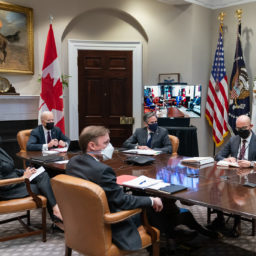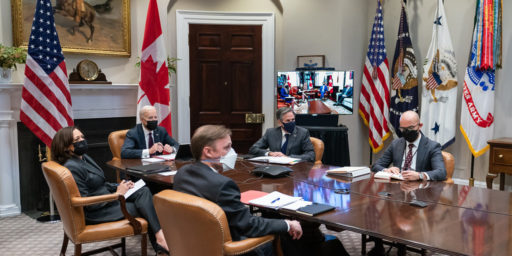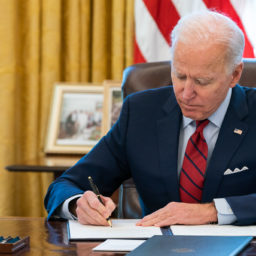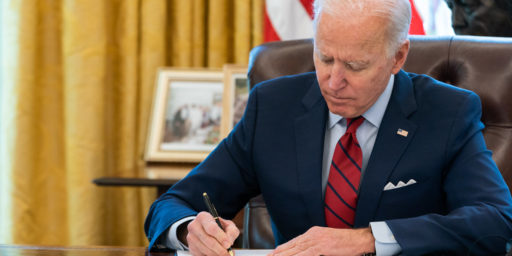

The War on Venezuela is Escalating
The SOUTHCOM commander has resigned and the Senate is debating, but it won’t matter.


Was Bombing Iran Legal, Redux
For all practical purposes, the Constitutional war powers have been stood on their head.


Presidential Immunity and the Catch-22 of American Politics
All of the legal remedies are impossible.


Liberals Upset Biden Foreign Policy is Biden’s
Those expecting Bernie Sanders’ agenda are sorely disappointed.
Iranian Attack Kills Americans
If a global pandemic and economic crisis weren’t enough excitement . . . .
House Passes Defense Spending Bill That Seeks To Limit Trump’s War Powers
The House of Representatives passed a defense spending bill that seeks to limit Presidential authority when it comes to striking Iran and aideing the Saudi war on Yemen.
Trump Abandons Restraint In Foreign Policy In Favor Of Interventionism
While he campaigned on a message of restraint, Donald Trump has largely adopted the interventionist foreign policies of his predecessors.
Biden Calls For End To U.S. Support For War On Yemen
Former Vice-President Joe Biden is calling for an end to American support for the Saudi war on Yemen.
Hillary Clinton Writes History’s Most Self-Serving Op-Ed
Having lost to him, she’s an ineffective voice on the matter of Donald Trump.


The War On Yemen, Congress, And The Constitution
The Wall Street Journal tries, and fails, to defend President Trump’s indefensible veto of the Congressional resolution regarding the war on Yemen.
Trump Vetoes Measure To Curtail U.S. Support For War On Yemen
President Trump has not surprisingly vetoed a Congressional resolution to limit American support for the Saudi war on Yemen. His defense for doing so is utterly absurd.
Congress Passes Resolution to End Support for War in Yemen
The Constitution’s invitation to struggle over foreign policy continues.


Congress Needs To Fix The National Emergencies Act
Instead of merely seeking to block the President’s declaration of an “emergency” at the southern border, Congress should instead significantly amend the National Emergencies Act.


Some Context for Presidential “Emergency Powers”
There is a bit of a disjuncture between the terminology and the reality (but that does not excuse Trump’s current actions).
House Vote Votes To End U.S. Assistance For Saudi War On Yemen
In a rare display of assertiveness in the foreign policy arena, the House voted yesterday to bar U.S. assistance in Saudi Arabia’s genocidal war on Yemen.


Senate Overwhelmingly Repudiates Trump On War On Yemen, Khashoggi Murder
In a small, but meaningful, step, the Senate has rebuked the Administration’s policies toward the Kingdom of Saudi Arabia.
All Politics Is National
Tip O’Neill was famous for once having advised his fellow Democrats that “all politics is local.” That’s not true anymore, and that’s unfortunate.
American Green Berets Assisting Saudi War On Yemen
American involvement in the genocidal Saudi war on Yemen is getting more complicated. This is a bad idea.
It’s Time For The U.S. To Stop Supporting The War On Yemen
Through our so-called allies in Saudi Arabia and the United Arab Emirates, the United States is helping to destroy Yemen. It’s time for our support for that war to come to an end.
Senate Democrats Throwing In The Towel On Kavanaugh?
Senate Democrats appear to be recognizing that there’s basically nothing they can do to stop the confirmation of Judge Brett Kavanaugh to the Supreme Court.
Trump Administration Argues It Didn’t Need Congressional Authorization To Attack Syria
Echoing the Obama Administration, the Trump Administration is arguing that it did not need Congressional authorization to attack Syria earlier this year.
Attacking Syria Without Congressional Authorization Would Be Illegal
Without Congressional authorization, any attack on Syria would be illegal, but don’t expect Congress to do anything about it.
Census Bureau Announces Plan To “Cross-Check” Responses To Citizenship Question
Yet more troubling news about the proposed citizenship question on the 2020 Census.
Trump Administration Claims It Needs No Legal Authorization To Keep Troops In Syria
Continuing a long-standard tradition, the Trump Administration claims it doesn’t need to get legal authorization to keep American troops in Syria.


Congress Needs To Act In Response To Trump’s Illegal War In Syria
With the Administration set to commit the United States to a forever war in Syria, it’s time for Congress to act.


Democratic Lawmakers Sue President Trump For Violations Of Emoluments Clause
Nearly 200 Members of Congress and the Senate have filed suit against President Trump alleging that he is violating the Emoluments Clause of the Constitution.
Our Feckless Congress Is Shirking Its Constitutional Duties On The War Against ISIS
Yesterday, the British Parliament debated the expansion of that nation’s military strikes against ISIS. For more than a year, our cowardly Congress has failed to even hold one debate or vote on America’s role in that conflict.
From Bork, To Kennedy, To Obergefell
He definitely wouldn’t appreciate it, but in some sense you can thank Robert Bork for the Supreme Court’s opinion in Obergefell v. Hodges.
Obama’s ISIL AUMF A Convenient (But Necessary) Excuse
Explaining my ambivalence around the latest escalation in our intervention.


Obama To Seek Authorization For A War That He Already Started
President Obama will ask Congress to authorize a war he started six months ago.


Why Congress is AWOL on National Security Policy
Has the legislative branch abdicated its responsibility in US foreign policy?


The House Lawsuit Against Obama; Full Of Sound And Fury, Signifying Nothing
The House of Representatives has filed its lawsuit against the President. As expected, it doesn’t amount to much.
How Obama Learned to Stop Worrying and Love the Imperial Presidency
A critic of the imperial presidency becomes an imperial president.


Unless Congress Steps In To Authorize It, The President’s War Against ISIS Is Illegal
As things stand right now, there is no legitimate legal authorization for the President’s war against ISIS, and that’s largely because Congress has failed to act.
The President’s War Is Lacking A Convincing Plan
The Administration’s policy in the President’s war against ISIS has no coherent plan, and that virtually guarantees escalation.
Pentagon Says Obama’s War Against ISIS Likely To Last Years
The war against ISIS continues to silently escalate, with little input from the people’s representatives in Congress.

















